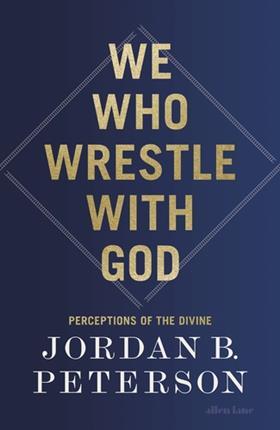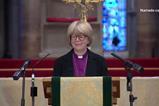Renowned Canadian psychologist and bestselling author Jordan Peterson is delving deeper into the Bible. We Who Wrestle with God tackles themes of sin, morality, and purpose. But does this 505-page tome mark his arrival at faith - or is he still on the journey?

Jordan Peterson continues his journey toward faith with his latest book - We Who Wrestle with God (Penguin). Many will know him for his bestselling titles, 12 Rules for Life and Beyond Order, which have sold ten million and five million copies respectively. He has openly stated that he lives: “as if there is a God” and happily appeared on Premier Unbelievable? in 2018 defending a theistic view under the title: “Do we need God to make sense of life?”
Now, with a book explicitly focused on God, Christians will wonder: is it time for Peterson to declare he has crossed to our side?
There’s much to enjoy in the book. Peterson is a respected thinker who has clearly engaged with the Bible with thought and consideration. He explores early biblical stories, believing they matter and is able to reach a massive audience from an array of of faith and non-faith backgrounds and in particular young men. The 505 page book covers Creation, Adam and Eve, Cain and Abel, Noah, The Tower of Babel, Abraham, Moses and Jonah.
Peterson shows that biblical ideas underpin so many values we take for granted
Peterson’s typical approach is to quote a Bible passage (often the KJV) and use it as a launchpad for exploring its themes and ideas, while weaving stream of consciousness style connections with other religions, ancient texts and modern books and films to highlight the prevalence and relevance of the ideas and themes across different cultures and peoples. The scope of this is vast - exploring philosophy, psychology, politics, culture and economics. In so doing he affirms the centrality of the Bible to Western culture, believing it produces the most peaceful and stable societies. Like in Tom Holland’s Dominion: the make of the western mind and Glen Scrivener’s The Air We Breathe, Peterson shows that biblical ideas underpin so many values we take for granted.
Peterson upholds biblical principles as wise for individual ethics and lifestyle, with one-man one-woman marriage valued against other alternatives; and has a fascinating perspective on how praying and scientific inquiry have similarities. He doesn’t flinch when God floods the earth, or commands the destruction of Israel’s enemies. He shows both a hatred of evil and recognition of sin while also defending God’s actions. Peterson’s aim is to draw the reader into a better life and grasp of the evil they need to shun - both within themselves and the wider world, including the influence of new atheists and the so-called ‘woke’ agenda.
So, what’s not to like?
Not all will find this book an easy read. The sentences are long and complicated - more of a university rather than GCSE level read and may require the use of a dictionary. Furthermore, Peterson mostly uses the biblical text as allegory. For example, Abram’s call from Ur represents a universal challenge of abandoning other goals to pursue the future we are being called into. Similarly, David’s victory over Goliath is the victory of the weak over the tyrant. It doesn’t matter whether Jonah was swallowed by a big fish, for he stands for all who learn to step up and speak out what their conscience knows. So although Peterson’s comments may be valuable, they don’t always come from the text in its proper biblical narrative. The many ‘aha’ moments are undermined by weak interpretation and bizarre application. Peterson would say that the Bible is ‘true’ but doesn’t seem sure that the events it includes actually happened.

Moreover, who is the God we wrestle with? This is hard to discern. In the prologue Peterson writes: “Conscience, important as it is— the conscience that makes itself manifest to Elijah— is not the only manifestation of God…”. Later, God is: “The spirit within us that is eternally confident in our victory”, and “the ideal to which we commit and sacrifice”. It’s not clear whether he accepts a classic orthodox understanding of the nature of God or not.
Mature Christians will likely find Peterson’s insights stimulating, marvelling at his connections and reflections. However, the average church attendee whose Bible knowledge is sadly not as in depth might become confused. And so although some seekers may find the book a useful starting point to explore more, they will need God wrestlers with a better grasp of the overall narrative and personal experience of him to find what they are looking for.
Has Peterson crossed over? The book would have been richer if he shared any wrestles he has personally had, but that is not his style. He doesn’t ever explicitly state ‘I’m a Christian’ but is keen to defend the God of the Bible, believes in God and desires for friendship with him. Some will say that Peterson is still journeying, others that he has arrived. You can make a case for either.
We Who Wrestle with God: A journey towards faith by Jordan Peterson is out now







































1 Reader's comment